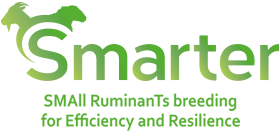
This project has received funding from the European Union’s Horizon 2020 research and innovation programme under grant agreement No 772787.
SMARTER Training School: “Using Genetics and Modelling to Improve Resilience and Efficiency in Small Ruminants”
SMARTER develops and deploys innovative strategies to improve Resilience and Efficiency (R&E) related traits in sheep and goats.
SMARTER is based on the following strategies: i) generating and validating novel R&E related traits at a phenotypic and genetic level ii) improving and developing new genome-based solutions and tools relevant for the data structure and size of small ruminant populations, iii) establishing new breeding and selection strategies for various breeds and environments that consider R&E traits.
SMARTER is coordinated by INRAE (Dr. Rachel Rupp) and assembles 27 partners from 13 different countries and has received a funding from the European Union Horizon2020 research and innovation programme under GA n. 772787.
Requirements
- Be doing a PhD in animal science, animal production, veterinary sciences (or similar) or have professional experience in a related field for minimum 3 years.
- To attend the whole 4 days of school
- In order to cover costs, selected participants will be required to sign an agreement. In particular in:
- Challenge Session: participants will be challenged through a session using datasets provided by SMARTER. They will be using the knowledge learned in the modules to undertake some analysis on non-yet analysed SMARTER datasets (e.g. ruminal temperatures) and test the model and assess its outcomes.
- Module 4: participants will be required to complete the survey designed in SMARTER to collect the stakeholder’s preferences for resilience, efficiency, health or production traits when it comes to the ideal animal to breed. The data collected from participants will be included in SMARTER data and will be analysed along with farmers’ data. The aim is to understand how professionals are trained and aware of up to date knowledge on genetic selection challenges and techniques, in comparison with farmers’ preference profiles. After completing the survey, the survey method will be discussed in particular how information collected can inform livestock breeding industries for adapting to the new challenges facing agriculture.
Selection process
The selection process will be carried out by a selection committee made by members of the project and the project coordinator. The process will try to ensure a good gender representation. At the end of the selection process the Committee will create a mailing list with the successful candidates and a reserve list. All applicants will be informed of the selection results within 3 working days from the registration deadline. Please ensure that you can access your email during this period.
General info school
The SMARTER training school “Using Genetics and Modelling to Improve Resilience and Efficiency in Small Ruminants” will be held in Toulouse (France) from 27th to 30th of March (4 full days). The school will be held in English.
Aim of the school
The school will delve into the strategies and tools used within SMARTER, allowing attendees to better understand how genetic selection can help improve resilience and efficiency in the animals of the future with a multidisciplinary approach.
Main topics: 1) Traits and methods to compute phenotypes; 2) Mechanistic and statistical modelling of resilience and feed efficiency; 3) Detecting Stress and evaluating ability to cope with stress; 4) How can resilience and efficiency traits impact system performances and modify farmers’ breeding choices
Trainees: maximum 25, early registration is recommended.
Fees
The registration is free and includes:
- Accommodation with breakfast (5 nights)*
- 4 lunches
- 3 dinners
- course material (eLearning included)
- certificate of attendance
*Partner institutions of the SMARTER project that send attendees will have to pay for their own accommodation. Non-partner institutions will have the costs covered.
Travel costs, extra nights, extra meals, transfer to/from the hotel, public transport are at the expenses of the trainee. Details about accommodation will be sent by email once the candidature will be accepted.
Deadline application: 28 February 2023
For more information contact: marlene@eaap.org

